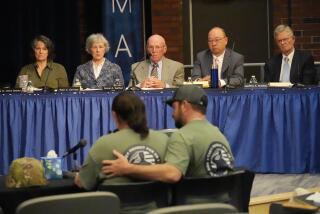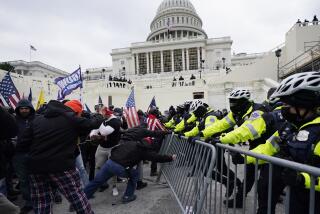9/11 Commission Is Bleak on U.S. Security Efforts
WASHINGTON — The final report from the Sept. 11 commission was not only a catalog of government failures in the years leading up to the attacks but a harsh assessment of the reforms that have come since.
In the comments of its members and the implicit criticism woven into its proposals, the commission made it clear that it saw a U.S. intelligence and security apparatus that had swelled but was still struggling to adapt to the challenges of the war on terrorism.
“We are safer,” the commission concluded. “But we are not safe.”
Passages of the final report suggested that the United States was far from solving basic problems -- including those tied to intelligence gathering and information sharing -- that plagued the government as it groped for clues to Al Qaeda’s intentions in the months before the 2001 strikes.
“The effort of fighting terrorism has flooded over many of the usual agency boundaries” in the wake of the attacks, the commission concluded in a section of the report. “But the problems of coordination have multiplied,” with agencies and analytic fusion centers tripping over one another as they scramble to connect dots.
“Continuing to this day,” the report said, “the intelligence community is not organized well for joint intelligence work.” The panel is particularly pessimistic about progress at the CIA, which under the commission’s prescriptions for reform stands to lose more clout and a larger share of the nation’s counterterrorism responsibilities than any other agency.
In an interview Friday, commission Chairman Thomas H. Kean, the former Republican governor of New Jersey, said he was “blown away” when the former director of central intelligence, George J. Tenet, told the panel under oath that the agency was five years away from fielding a fully capable roster of overseas spies.
Kean said the CIA was still so hobbled by a culture that abhorred sharing secrets with other agencies that as recently as six weeks ago the commission was learning of new intelligence reports that were still not being disseminated.
“The FBI -- we’re very complimentary of their improvements. The only thing we worry about there is sustainability,” Kean said. “The CIA is a little more difficult to penetrate, but we think they need more work. It’s better, but these problems are still there. It’s still a culture of not sharing.”
The vice chairman of the commission, Lee H. Hamilton, a former Democratic congressman from Indiana, suggested during a meeting with reporters Friday that the CIA was focused on protecting its turf and had failed to come to grips with institutional flaws.
Asked for his reaction to recent comments by acting CIA Director John McLaughlin that the agency “gets it,” Hamilton said: “You wouldn’t expect the present director, whether he’s acting or permanent, to be the leading voice for reform. You expect the director to defend the status quo, and that’s what he’s doing. We’re saying the status quo doesn’t work.”
The CIA disputes the criticism. In a rare briefing for reporters at agency headquarters last week, three senior CIA officials touted the agency’s work to transform itself over the last three years.
Speaking on condition of anonymity, they said walls that once prevented intelligence sharing have crumbled. The latest crop of recruits is the largest in agency history, they said, and policymakers need to be cautious about potentially counterproductive changes.
Although commission members and some lawmakers aren’t so sure, “we do get it,” a senior agency official said. “We have to make sure that this isn’t some sort of an exercise where boxes are moved on a chart and everyone feels better when the exercise is over.”
In its 567-page report, the commission recommended the appointment of an intelligence czar who would outrank the CIA director and coordinate the activities of all 15 U.S. intelligence agencies. The panel also urged the creation of a national counterterrorism center that would have legions of analysts and the ability to direct certain intelligence operations overseas -- roles that were long the domain of the CIA.
The CIA’s own counterterrorism center has mushroomed since Sept. 11, with more than 1,500 officers working for it, compared with a few hundred before the attacks. And CIA officials note that hundreds of other officers who work in other branches of the agency -- from Middle East analysts to overseas operatives -- are also focused on terrorism.
Critics of the report contend that creating a new counterterrorism center outside the CIA risks impairing coordination rather than improving it. But the commission made it clear that it did not believe the CIA was up to the job.
The Bush administration took its own stab at establishing an independent analytic hub last year with its Terrorist Threat Integration Center. With more than 100 analysts, the center is supposed to serve as a clearinghouse for terror warnings fielded by all of the nation’s intelligence agencies. President Bush touted the new organization in his 2003 State of the Union address.
But the commission concluded that the center, known as TTIC, represented a flawed approach. It struggles to get the attention of policymakers, lacks the authority to direct the collection activities of other spy agencies and competes with counterterrorism centers at the CIA, FBI and Homeland Security Department.
“It’s just kind of standing out there detached from the main vertical organizations of government,” said Philip Zelikow, the Sept. 11 panel’s executive director, in a discussion with reporters Friday. “You have fusion centers all over the government because everybody’s building their own. And then you have this one more fusion center ... that has not realized its potential.”
The commission also expressed concern about the Byzantine structure and confusing lines of authority in the Homeland Security Department, stitched together from 22 agencies two years ago. Kean noted Friday that the department reports to 88 congressional committees and subcommittees.
The FBI -- which bungled key opportunities to prevent the Sept. 11 attacks -- was left largely unscathed by the recommendations. During hearings this year, commission members asked whether the country should create a domestic intelligence service, stripping that responsibility from the FBI.
But the commission rejected the idea largely because it found that FBI Director Robert S. Mueller III was making headway transforming the bureau’s focus from catching criminals to preventing terrorist attacks.
“One reason that the commission was not harsher about the FBI was because of a guy named Bob Mueller,” Zelikow said. “He has acknowledged he has a problem, he has stepped up to the problem and he is working.”
*
Times staff writer Ricardo Alonso-Zaldivar contributed to this report.
More to Read
Sign up for Essential California
The most important California stories and recommendations in your inbox every morning.
You may occasionally receive promotional content from the Los Angeles Times.










